Social justice, Lenny Kravitz, and a Quaker Meeting Mixtape
Mark Condo brings an unexpected inspiration to his latest sermon series: rock and roll.
The pastor of Reedwood Friends Church has created a mixtape for his Portland, Oregon congregation full of songs that have preached to him. He shares the first track in his vocal ministry mixtape with us this week: a sermon inspired by Matthew 25 and “Does Anybody Out There Even Care” by Lenny Kravitz.
Subscribe so you don’t miss an episode!
What songs would be on your Quaker Meeting mixtape and why? Tell us in the comments!
Download the transcript and discussion questions.
Discussion Questions
- If you were to make a mixtape of songs that have been meaningful to you over the years, what would be on it? Why do those songs continue to resonate with you? Is there a call to action in them?
- Mark Condo says the presence of God is “almost shy.” Have you found that to be true? How does an examination of Matthew 25:35-40 affect your perception of where the Spirit is?
Mark Condo
Are you moved to act from a moral center of living? Are you moved to act when you see the world around you? If not, why not? I think that’s what good artwork does to us. It prompts action.
Various
Thee Thee Quaker Podcast: Story Spirit Sound.
Georgia Sparling
I’m Georgia Sparling.
Jon Watts
And I’m Jon Watts.
Georgia Sparling
And it’s time for a new vocal ministry episode.
Jon Watts
Great. I love doing these.
Georgia Sparling
Yes, the experiment continues. So do you want to remind the folks at home what these episodes are about?
Jon Watts
Sure. So vocal ministry is an important part of Quaker meeting, whether it’s an unprogrammed meeting, a program meeting, or semi-programmed, every Quaker meeting has a period of time where anyone can stand up and speak. Now, Quakerism is not a monolith. We all have different processes for composing these messages. But it’s generally agreed on that we are trying to say something that was inspired by the Spirit. So with these vocal ministry episodes, which we’re doing about once a month on the podcast, we really want to bring a range of Quaker voices from the liberal unprogrammed to the evangelical and everything in between.
Georgia Sparling
Right, and even in the three, now four, vocal ministry episodes that we’ve done, we’ve had a big range of faith practices and beliefs. We’ve had a sermon from Ashley Wilcox, who’s a pastor at a semi-programmed meeting in Greensboro, North Carolina. We had a collection of essays from the unprogrammed Central Philadelphia Monthly Meeting. And then most recently, Craig Freshley shared a message from his semi-programmed meeting.
Jon Watts
Right. And these episodes have generated a lot of discussion.
Georgia Sparling
It makes for some really engaging conversations on our episode pages and our social media for sure.
Jon Watts
Yeah. And that’s what we’re hoping for with these episodes. Not that every listener will agree with every message that we publish, but we want to invite you to tune in in the spirit of worship, that we’re giving it over to the speaker to be faithfully sharing what they’ve been given, even if that means sometimes that we’re listening in tongues.
Georgia Sparling
Yeah, so let’s keep that going with our first evangelical Quaker vocal minister. His name is Mark Condo, and he pastors Reedwood Friends Church in Portland, Oregon. And Mark comes from an evangelical tradition in Ohio.
Jon Watts
Awesome. Yeah, I met Mark on my last trip to Portland. He’s got a really great presence and he struck me as a really thoughtful friend. I was so glad to hear that he was willing to come on the show to share this message with us.
Georgia Sparling
Yeah, me too. And the message that he’s sharing with us today is the start of a sermon series that he’s titled “Songs That Preach,” and he likens it to a mixtape that he’s making for his congregation.
Jon Watts
Oh, a mixtape? Yeah, as a as a musician. I can really relate to how mixtapes can be an expression of the Spirit. And also it, you know, is kind of nostalgic that takes me back.
Georgia Sparling
It totally does. I think it’s a really cool idea.
Jon Watts
Yeah. So how is Mark crafting this mixtape? How does that work with his church on Sunday mornings?
Georgia Sparling
Well, I’ll let Mark explain that to us. And also tell us more about himself and his congregation.
Jon Watts
Sounds like a plan.
Mark Condo
My name is Mark Condo, and I am a minister at Redwood Friends Church in Portland, Oregon. I had a pretty powerful conversion/convincement experience when I was 18. And, you know, this, this encounter with Christ, this encounter with God, you know, me made this really deep impression on me. I really felt like I was awakened to something some aspect of life that I was always curious about, or even had kind of existential dread about and then upon realizing that it was friendly, and that it was benevolent. I fell in love with it, you know, and that love was over the course of years and learning and self exploration.
And then finally, I was starting to get intimations of okay, well, maybe this is, maybe this is more than just a spiritual awakening. Maybe this is a vocation. I never intended to go into ministry at all, you know.
We moved cross country from Ohio where I was ministering there. I’ve been at Reedwood for a little over four years now. That’s a 130-year-old Quaker meeting that did not originally start at Redwood. It started as First Friends Church there in Portland, Oregon. Ever since the pandemic, we have a both online and onsite attenders. And it’s a traditionally, you know, run programmed Quaker meeting. The membership at Reedwood really holds a high premium on, like education and learning, learning as, as an act of worship learning as a spiritual experience. It was a process of exegeting the meeting, you know, and what are the what are these families? Or what are these people perhaps going through? And what are their questions? And what are they looking for? You know, you just go for it, it has my, my inspiration, it has to be something I’m interested in, it has to be something that is, can, you know, speak to me?
How is this section of the Bible or this story from the Bible, or this poem, how is the how are these things relatable and interconnected, I love connecting things. So that’s, that’s a little bit of what I’m going to be doing. I want to connect stories within songs that have helped awaken my conscience to things that maybe I was numb to or blind to. So that was, that’s my sermon series for September. I’m calling it “Songs That Preach,” and we’re going to be visiting songs that I’ve encountered throughout the years that have helped me along to become a more human person.
I don’t listen to a lot of preaching. You know, just, I have to find inspiration elsewhere. And I find that inspiration and songs I listen to very honest music, honest writing, poetry, and of course, the outdoors. You know, those are kind of like the sermons that I that I pay attention to this week is going to be Lenny Kravitz is “Does Anybody Out There Even Care” It’s off his “Let Love Rule” album, and a high school friend of mine kind of shared some, you know, albums with me, you know. Back then it was probably a mixtape. And there was a song: “Does Anybody Out There Even Care.” The song stuck out to me because of how poignant it was about stating racial issues. And the imagery that’s in the lyrics was was very powerful to me. And it was like a cup of cool water, you know, to me, of oh, here’s someone talking about something and singing about something that for this, for this Midwest kid wouldn’t really know where to begin. You know, so it was almost like a, it was almost like a sermon to me. Even back then, and that was kind of pre convincement Mark, you know, but it was it was my heart was tender to that. And so that’s why it kind of stuck with me. Even today. I’ll listen to what it says. Because, yeah, it had that that emotional impact on me.
Georgia Sparling
After the break, Mark shares his Lenny Kravitz-inspired message.
Jon Watts
Hi, it’s Jon here. Everyone has a different experience in waiting worship. For me, it’s a time when ideas come to me sometimes fully formed. When I was a songwriter, I would be sitting in the silence and have to run out of the room to grab a notebook and write down lyrics or song titles.
Later, as a video producer, I would get ideas for videos that might go viral on YouTube. These days, when I sit in silence with other Quakers, project ideas come to me big things that I could never accomplish on my own. In 2020, I was sitting in worship, and I was given the idea for a Quaker podcast. And not just any podcast, one that attempted to feature authentic Quaker ministries. I wrote it down in my notebook, but the logistics seemed overwhelming. I brought it to my meeting, and we had a clearness committee.
And now, three years later, I’m so excited to be speaking to you from that very podcast, a podcast that wouldn’t be possible without the support and grounded vision of literally hundreds of Friends. And we’re featuring vocal ministry. I want you to just imagine that potential years from now have this repository of faithful Quaker messages from all over the world that we’re building one episode at a time. And that’s just one of the dreams that we are working on realizing here at the Quaker project. But in order to do it, we need your help. I’d like to ask you to please consider joining those hundreds of Friends who want to see this vision become a reality. Go to theequaker.org. That’s theequaker.org. And sign up to give 5, 10 or even 20 dollars a month toward making this ministry sustainable and supporting our work in giving Quakers a platform on 21st Century Media.
Georgia Sparling
Welcome back, we’re now going to hear the first track of Mark Condo’s mixtape AKA his sermon, beginning with a scripture reading from a member of Reedwood Friends Church.
Good morning. Our reading this morning is from Matthew 25, verses 35 through 44, I was hungry, and you gave me food. I was thirsty, and you gave me something to drink. I was a stranger, and you welcomed me. I was naked, and you gave me clothing. I was sick, and you took care of me. I was in prison and you visited me? “Then the righteous will answer him.,’Lord, when was it that we saw you hungry and gave you food? Or thirsty and gave you something to drink? And when was it that we saw you a stranger and welcome to or naked and gave you clothing? When was it that we saw you sick or in prison and visited you?’ And the King will answer them, ‘Truly I tell you, just as you did it to one of the least of these who are members of my family, you did it to me.'”
Mark Condo
In the text we just heard, we can see how the early Christian community was invited into a new way of living. That’s what it is. It’s it’s really an invitation to live differently, to see differently, to behave differently in this world. Unique to this way of of living was to have this openness to what some may call a continuing revelation. To live in such a way where you’re expectant of something you’re looking for something. That is faith is not a static set of rules that we may be intellectually ascede to. But it rather faith is a dynamic lens whereby we encounter the world that we live in. That’s what it is to kind of engage and embody this message.
What’s the question that this text is asking us? Where do we encounter the reality of God in life? Where do we kind of see and apprehend God and divinity? Where does it consistently manifest in this world? And in our experience? Where is God active and moving in the world?
Jesus’s apocalyptic story then about what the conclusion of the age will be like asks the gathered human family is surprising an unexpected question by this cosmic vision of Christ. And the question is this: Did you happen to see me while you were down there living life? Did you happen to see me? And did you know that you were supposed to be looking for me? Was that on the radar? Did you find out where I was hiding in plain sight? Did you see me? Those designated in the text as the righteous answer back with some trepidation. Were we supposed to be looking for you? So, where are where are we supposed to be looking? And if you notice that Christ doesn’t say, your worship meetings and your churches, he doesn’t say that. What does the text answer? It says, didn’t you see me there among the hungry, waiting to be fed? Didn’t you see me where there was thirst waiting to be quenched. I was there among those waiting to be clothed and dignified. I was with the imprisoned waiting for liberation and for visitation. I was with those who were afflicted, sick and lonely, waiting to be seen, and embraced. And to the righteous. He says, You did these things. You encountered me there? Uh huh.
Here we have a good lead on where we encounter the presence of God, that presence of God that is that seems to be elusive. It’s almost shy, the presence of God. Where is it? Where do we where do we experience that? Where do we find that, we may ask? And Christ is saying that the divine riddle is answered when we serve and give our lives over to one another. And when we slow down and consider the deep needs of our neighbors, and our neighborhoods, Christ is saying, you will find me there.
To this point, in 1949, American writer, activist, and theologian, Howard Thurman wrote a book entitled “Jesus and the Disinherited,” where he states the following. He writes, “The masses of men and women live with their backs constantly against the wall. They are the poor, the disinherited, the dispossessed. So what does our religion say to them? The issue is not what it counsels them to do for others whose need may be greater, but what religion offers to meet their own needs. The search for an answer to this question is perhaps the most important religious quest of modern life.” “Jesus and the Disinherited,” Howard Thurman.
So my question would be what helps us see what Thurman is writing about there? How do we kind of engage and interpret and see what Matthew 25 is talking about? It’s one thing to acknowledge what is being said it’s another to have it embodied as a part of our actions and as a part of our faith journey. What does it mean then to arrive at these things? It’s often unexpected and seems accidental, what can awaken and stretch us in seeing life in a new way, in my high school friendships and even the music that was passed around among us that we listened to and shared between one another. Looking back and thinking back, this played a big role in helping me develop a broader and a more empathetic vision towards my neighbor, towards the world, if not towards life itself. Starting way back there in the ‘90s, listening to songs and being around people that were asking bigger questions that had to do with the welfare of my neighbor, the welfare and the justice of society. There were songs that were self aware enough to address painful social concerns, crucial at that time and still remain so today, some 30 years later.
In my teenage years, it was not so much the institutions of worship or institutions of public education where I learned about the ongoing sin of systemic racism. Honestly, it was listening to ‘70s and ‘80s punk rock music, how a genre of music addressed other realities of grave concern, such as sexism, abuses of government, the plight of us militarism, gloat colonization, even global ecological destruction. Those messages were in those songs I was listening to. Okay, so what does this have to do with what we just heard? And what we were just reading? When you look at the world around you? Do you see? Are you moved to act from a moral center of living? It’s asking, are you moved to act? When you see the world around you? If not, why not? I think that’s what good artwork does to us. It prompts action, it prompts awareness. It prompts a sense, a larger view of what’s going on in the world. A little bit more about growing up in the 80s and the 90s. About this kind of subculture that I was in whenever you liked someone in the 80s, and the 90s, you would make them a mixtape of songs that were meaningful to you. This is a little bit of what I’m doing now. I want to share songs with my meeting that have spoken to me, I would like us to listen together to a song. The title of the song is itself a question. “Does Anybody Out There Even Care,” performed by Lenny Kravitz, and this was released in 1989. And the song sets the question before its listeners, are we complicit as we are witnesses to racial injustice and violence? Are we complicit? It’s a song of protest. It’s a song of not staying complicit. And so it was a brave and bold and a courageous song. What is my response to Lenny Kravitz question. So this is song number one to my mixtape. Here to my Quaker meeting,
Georgia Sparling
Since it’s a little pricey to license Lenny Kravitz’s music, we asked a voice actor to read the lyrics to the song for us. We will also have a link to the song in the show notes.
Mark Condo
What is our action? Social justice action is spirituality according to date to today’s scripture. I was fed, I was given drink. I was clothed, I was visited. You encountered me the living Christ. Social justice is to be the primary concern of any religious practice, according to Howard Thurman. If there is religion being practiced, it must address the disinherited and the poor. It must help. It must be involved. Social justice is deeply needed still today. How can we be faithful in our response to stay involved with that which involves not just a few of us, not just a demographic but all of us? How can we stay involved? How can we be faithful to that? That’s the query. That’s the question. That’s what’s brought to the fore. Let’s see how this settles. Let’s attend to the inward teaching of Christ. Let’s attend to spirit.
Georgia Sparling
After Mark shared his message, I called him up for a debrief.
This is a question kind of we’ve been asking everybody is like, how did it feel to give that message on Sunday?
Mark Condo
I was a little bit more self aware than usual. This because of the nature and the goal, I guess, of what I wanted to do, I was trying something new, it was a risk on my part. And I thought, well, you know, let’s take a risk. And and if you don’t have that element of risk, you’re probably doing yourself a disservice by not risking, so I’d rather risk take a little chance. And it’s never going to come off as as planned as you have in your imagination. And some things are better, and some things are, well, I can improve upon that. So and you just move on.
Georgia Sparling
Right. Well, what’s something that came out better than you thought it might?
Mark Condo
I think the the way that people receive the song. It’s a rock song and Reedwood is an older congregation. So it’s like, alright, we’re gonna listen to some rock and roll. The feedback was, “never heard a Lenny Kravitz song accompanying a sermon before, you know, well done.” And then, of course, other that sparked you know, other people’s imaginations. Someone was was mentioning a Lauryn Hill song that they were thinking of and I appreciated that.
Georgia Sparling
And one thing that you said during your sermon was something about basically good artwork prompts action. And so I’m wondering if you could unpack that a little bit.
Mark Condo
Really, anything in the human experience can become static. And there’s something about the arts and something about things that speak to the condition of our heart, usually starting with where we are not where we should be, you know, the arts have that that ability to kind of cut through the language barriers, and they have this, you know, kind of creative way to make to make a path where we we may have stopped, stopped looking, you know, the the song itself may not give instruction, or the artwork itself may not give instruction of what that action ought to be. But at least it will at least prime your imagination and prime your creativity in order to to start thinking of new possibilities.
Georgia Sparling
Yeah, yeah. Matthew 25, verse 35 through 40 is a tough one, because it makes sort of everybody your neighbor, and it is the people that is our maybe hardest, often for middle class, upper middle class folks to interact with. You know, Jesus says that to me. So, as you’ve reflected on this passage, how have you seen that in your own life in ways that you want to apply that or that you’d like to see your congregation interact with more?
Mark Condo
That passage is really an apocalyptic passage, you know, it, my attraction to it and my identification with it is, okay this expands and inflates our idea of what the incarnation is, and how there’s this kind of incarnational spirituality, that Christianity is an incarnational spirituality where really everyone that we encounter, we can see our creator in and how that’s a powerful that’s a powerful thought it kind of it breaks down and dismantles kind of an us and them type way of seeing our neighbors, you can’t say them and claim to be in union with your Creator. I don’t think I was hoping for like an outcome of okay, well, we need to do more in terms of, you know, Portland’s homeless, this population or it was just kind of it was a it was a, it was just kind of a timely reminder, within our neighbor there is the one in whom we give our allegiance to spiritually speaking. And in a way that would be true to your calling.
Georgia Sparling
Thank you so much for chatting with us and for sharing your message Mark.
Mark Condo
Thank you, Georgia, and it was a real pleasure to do so.
Georgia Sparling
Thank you for listening and thank you to Mark Condo for sharing his message with us. We did trim the sermon down for time with his permission, but you can visit our episode page to find a link to the full Sunday service. While you’re there, you can also find a link to Lenny Kravitz’s song, our discussion questions for this episode, and the transcript.
This episode was produced by me, Georgia Sparling, and Jon Watts. Jon also wrote the music for this episode. Khareme Lambie was our voice actor.
Thee Quaker Podcast is part of the Quaker Project, a Quaker media organization with a focus on lifting up voices of spiritual courage and giving Quakers a platform in 21st Century Media. If you want to give to our work, we would so appreciate it. Please consider becoming a monthly supporter you can learn more about about how to join our gaming team at TheeQuaker.org That’s TheeQuaker.org. Every contribution expands our capacity to tell Quaker stories in a fresh way.
Before you go, I wanted to share a comment we received on Spotify about last week’s episode with cozy mystery writer Edith Maxwell. Commenter ADrift writes, “So excited. Last year I started reading Maddie Day books. (And if you haven’t listened to last week’s episode yet, that’s Edith Maxwell’s pen name.) Anyway, ADrift says that is how I discovered Quakerism. I’ve since been attending Pittsburgh Friends and feel I found my spiritual home. Thanks, Edith!
And thank you ADrift for your comment. If you have a minute, would you also leave a comment on either Spotify or Apple podcasts or the podcast app of your choice and tell folks what do you like about the show? It helps them figure out if it’s something they want to listen to.
If you’re more inclined to share your thoughts via voicemail, why don’t you give us a call? The number is 215-278-9411 and you just might hear yourself in the spot. Again, that number is 215-278-9411.
Okay, we’ll be back in two weeks with a brand new episode.
Recorded and edited by Georgia Sparling and Jon Watts.
Original music and sound design by Jon Watts (Listen to more of Jon’s music here.)
Voice actor: Khareme Lambie
Mixing and mastering by Studio D
Supported by listeners like you (thank you!!)
Referenced in this episode:
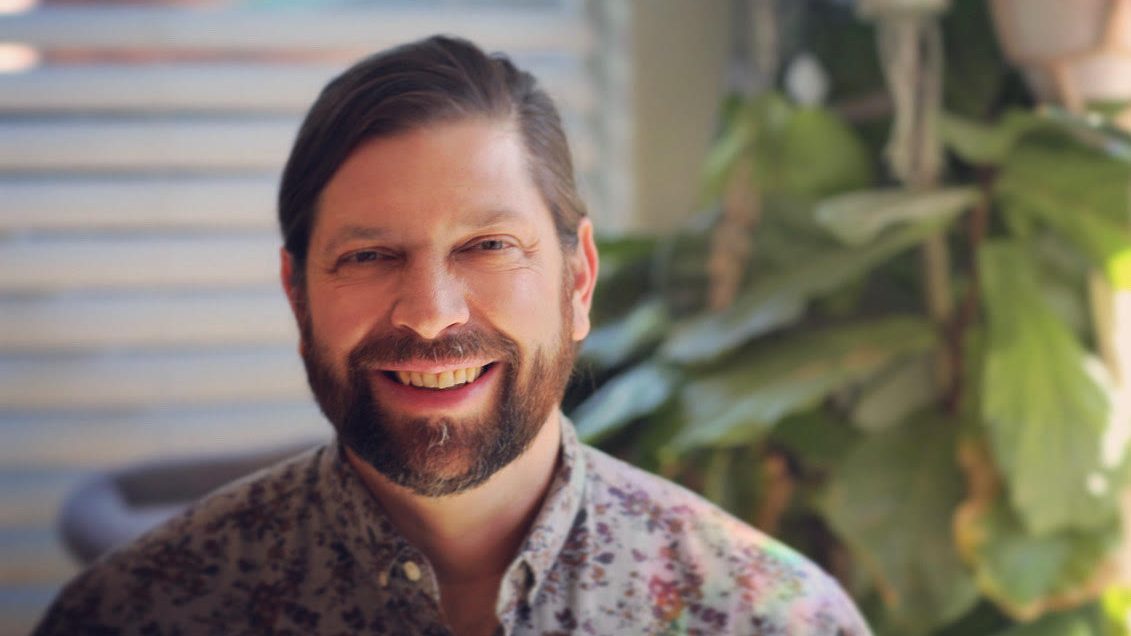
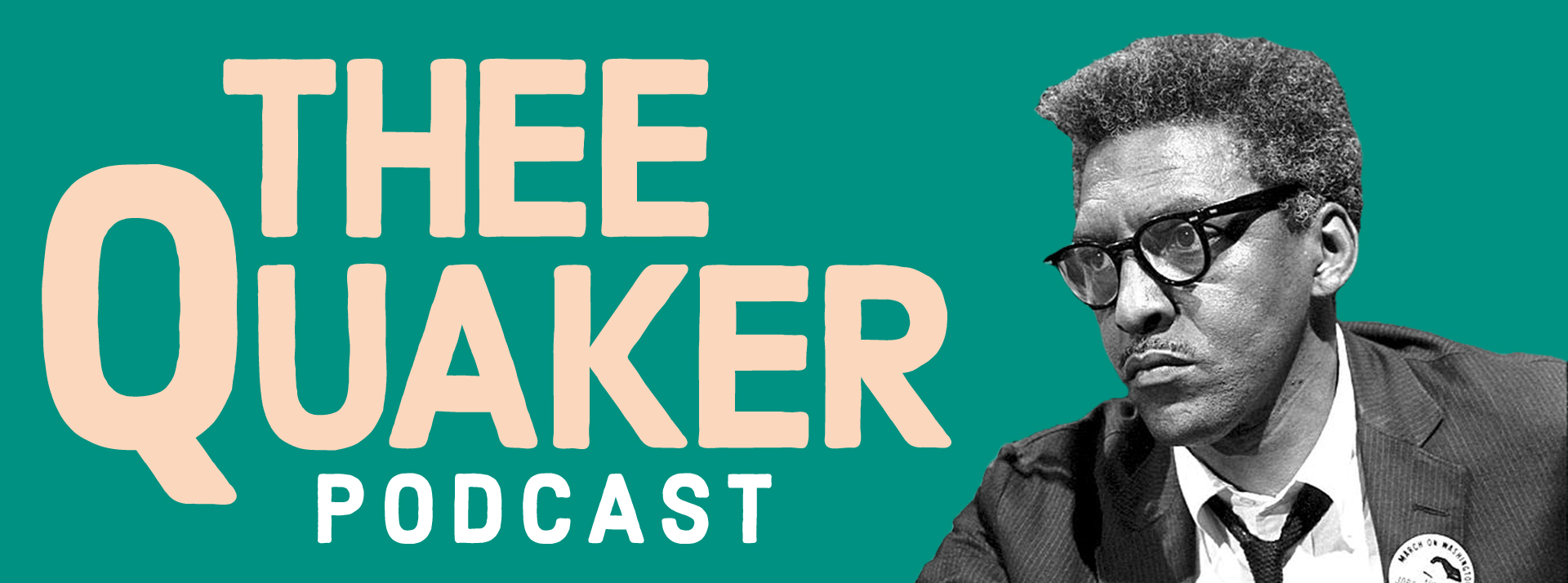

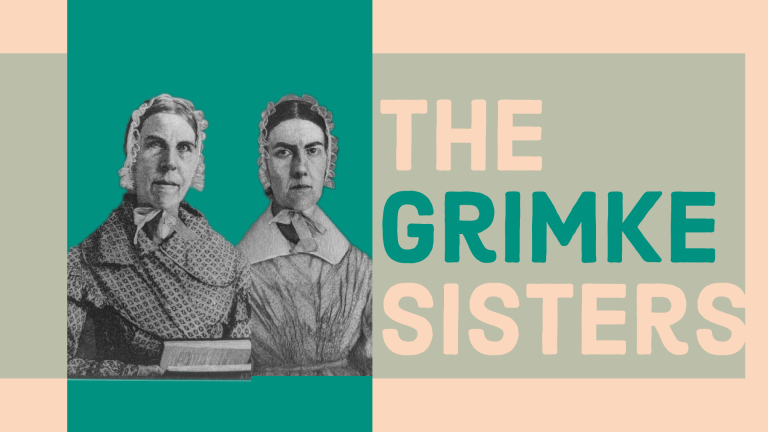
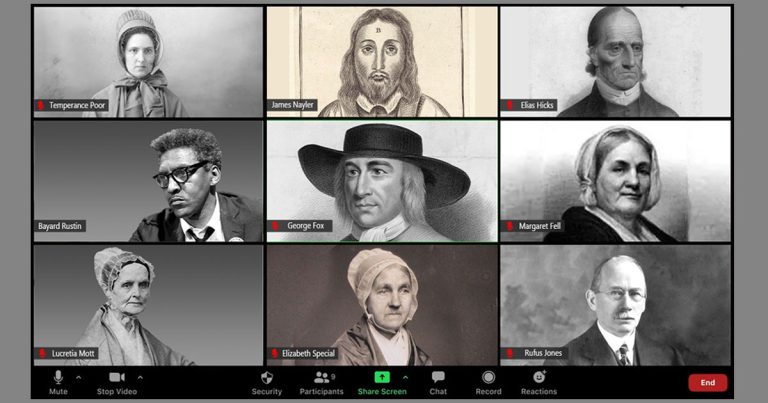
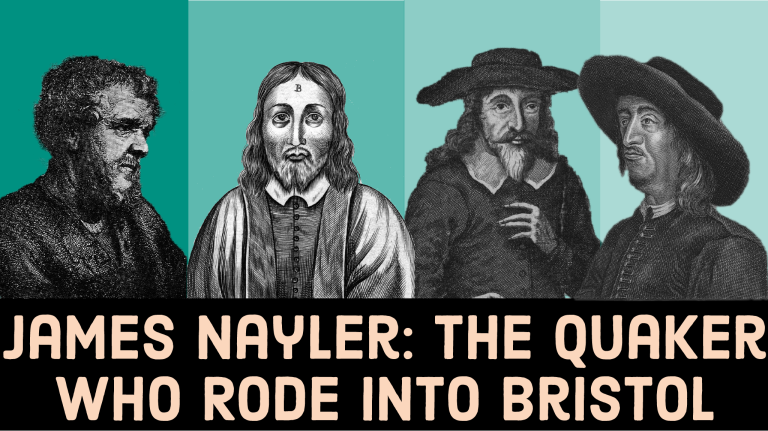
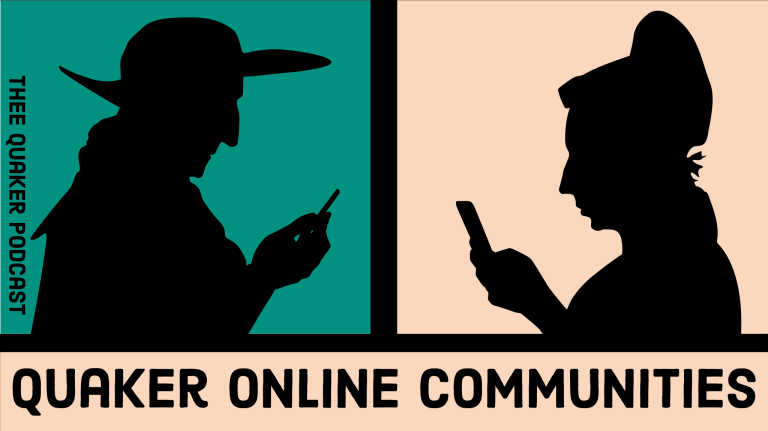
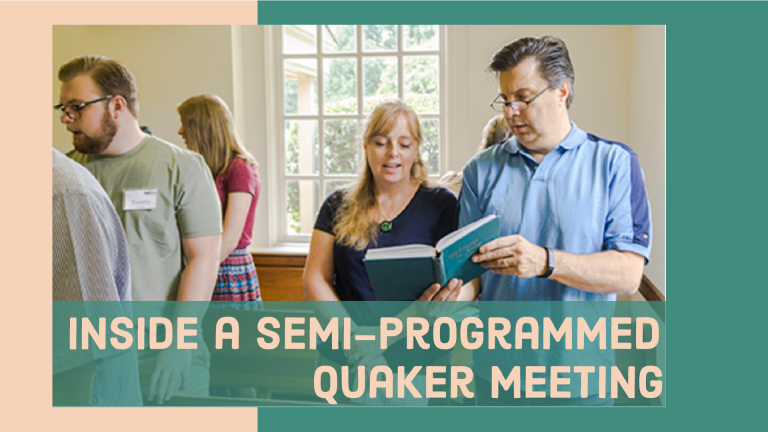
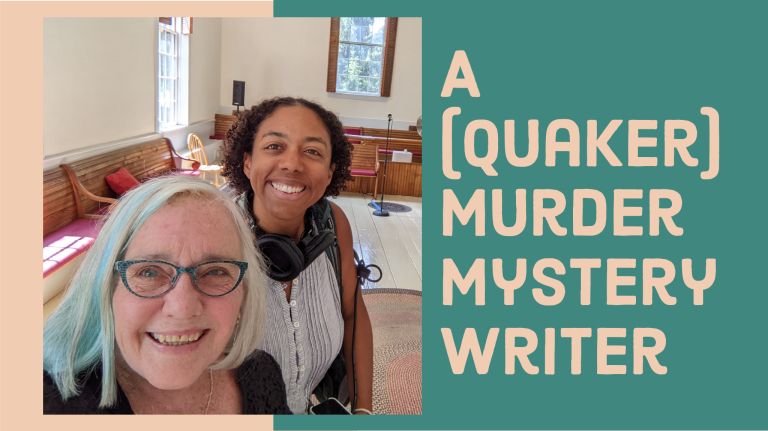
Thanks for sharing Mark Condo’s message on music and social change. Growing up in Albany, Georgia in the 1970s, I was greatly influenced by the music I listened to. It helped me to see a more hopeful world was possible. Here are some lyrics by Yes, my favorite group. Reading them you may see one reason why I became a Quaker.
Soon oh soon the Light
Pass within and soothe the endless night
And wait here for you
Our reason to be here
Soon oh soon the time
All we move to gain will reach and calm
Our heart is open
Our reason to be here
I was really short with a pan handler who had come into a restaurant at lunch this week and was pitching a story about needing money for him and his kid so they could eat. People offered to buy them meals (it was buffet) but he refused and there was no kid in site. Mark’s comment, “Did you happen to see me down there…?” really made me think. I have lived my life in the church and have had personal commitment since my teenage years to stay in the Faith. I’ve heard this reading at least 40 times over the years in sermons and Sunday readings, probably closer to 60. But it hit me this morning when I heard Mark’s rephrasing of it. It is amazing how humbling a simple comment can be to realize how short of God’s expectations we are. I appreciate Mark’s reminder that Jesus is in the person disrupting my conversation with friends and I need to react accordingly. Thanks for the reminder. by the grace of God I’ll hopefully do better next time! Peace!